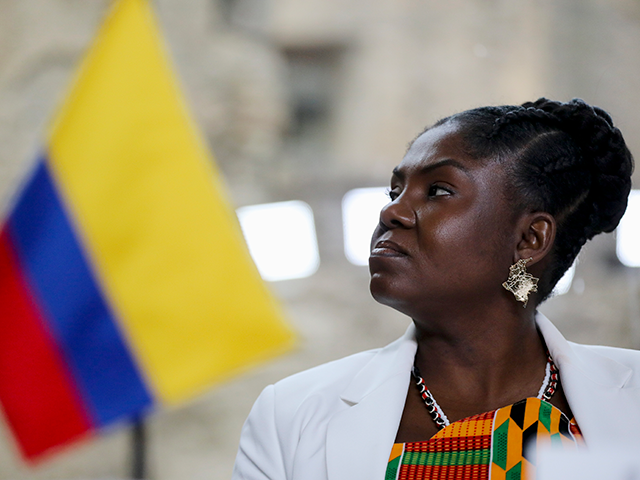Colombia’s far-left vice president, Francia Márquez, demanded on Monday that United Nations member states commit to “establish[ing] historical reparations actions” for Afro-descendants and African people in the name of “racial justice.”
Márquez made the comments during the first-ever session of the United Nations’ Permanent Forum on People of African Descent in Geneva, Switzerland. She became Colombia’s vice president this year under far-left radical President Gustavo Petro, who used his first address to the United Nations in September to promote cocaine trafficking. Prior to becoming president, Petro was a member of a Marxist terrorist guerrilla known as M19.
Márquez, who presided over the Permanent Forum’s first encounter, also demanded that “colonizer” U.N. member states that engaged in slavery in their past forego the foreign debt of countries such as Colombia so that they can “recover the dignity that was expropriated from them.”
“We come here to propose actions to cancel foreign debt as a path of historical reparation for the Afro-descendant population,” Márquez said during her speech, “[for] our countries that continue to pay foreign debt to colonizing countries and that have been committed to slavery.”
“They have not allowed us to live in dignity because a large part of the resources of our nations go to pay foreign debt and, for this reason, Afro-descendant populations continue to be the most excluded and marginalized,” she continued.
Márquez asserted that foreign debt forgiveness to Afro-descendants has been a subject that the United Nations has evaded “for many years.”
“It is necessary that, if we want to advance in a concrete manner, [U.N. member states] assume to address specific actions on this issue, which contribute to transforming colonial systems in terms of access to justice and economic and social development for the Afro-descendant population,” Márquez expressed.
The United Nations established the Permanent Forum on People of African Descent in 2021 as part of the international organization’s “Programme of activities for the implementation of the International Decade for People of African Descent (2015-2024).”
Márquez celebrated the inauguration of the permanent forum during her speech, expressing that it is an important step on the part of the United Nations and its member states towards “joining the fight to overcome structural racism and its impacts on Afro-descendant communities and peoples.”
The vice president added that “structural racism” allegedly had “differential effects on the most marginalized groups, such as black women, young people, and people from the LGBTIQ community.”
While Márquez celebrated the establishment of the permanent forum and presided its first session, she pressed the United Nations to do more than establish conversation groups.
“Forums are not enough, recommendations are not enough, structural changes are needed to prevent Afro-descendant populations from continuing to experience situations of colonization and situations similar to slavery,” she said. “We recognize and validate that the Decade for Afro-descendants has been established but, in a concrete way, we do not see the changes that positively impact the lives of the populations.”
Márquez also urged U.N. member states to make commitments towards “racial justice” while stating that Colombia — now led by a far-left government — is “committed to advance in actions of racial justice.”
“From the new government, we are committed to consolidating that participation and assuming a greater leadership role in the fight against racism and the protection of the rights of Afro-descendant peoples,” Márquez said.
In addition to “racial justice,” Márquez also made mention of “climate justice” in her speech, stating, “you cannot talk about it without addressing racial and gender justice,” as, according to Márquez, environmental deterioration “disproportionately affects African and Afro-descendant populations.”
“Dignifying the black peoples in the world and allowing Africa to reconnect with its diaspora, is to take great steps in the reconciliation of humanity,” Márquez posted on Twitter on Monday afternoon.
Márquez concluded her speech by expressing hope that the forum “will allow us to establish structural transformation agendas that will lead to dignifying the lives of Afro-descendant peoples in the world, to reconnect Africa with its diaspora and that will lead us to reconcile as humanity.”
Shortly after she concluded her speech, Márquez resumed her “reparations through foreign debt forgiveness” demands through a post on her Twitter account.
“We propose the cancellation of external debt as [historic reparations] to the peoples who have suffered colonialism, transatlantic trafficking and enslavement,” the post read.
Christian K. Caruzo is a Venezuelan writer and documents life under socialism. You can follow him on Twitter here.

COMMENTS
Please let us know if you're having issues with commenting.